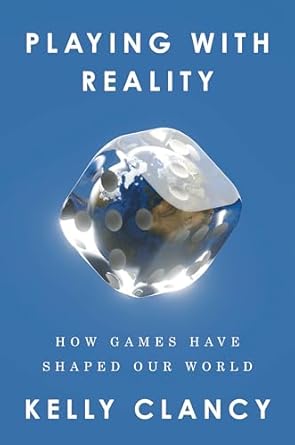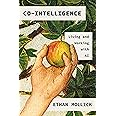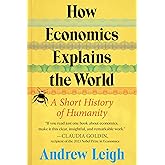
Amazon Prime Free Trial
FREE Delivery is available to Prime members. To join, select "Try Amazon Prime and start saving today with FREE Delivery" below the Add to Cart button and confirm your Prime free trial.
Amazon Prime members enjoy:- Cardmembers earn 5% Back at Amazon.com with a Prime Credit Card.
- Unlimited FREE Prime delivery
- Streaming of thousands of movies and TV shows with limited ads on Prime Video.
- A Kindle book to borrow for free each month - with no due dates
- Listen to over 2 million songs and hundreds of playlists
Important: Your credit card will NOT be charged when you start your free trial or if you cancel during the trial period. If you're happy with Amazon Prime, do nothing. At the end of the free trial, your membership will automatically upgrade to a monthly membership.
Buy new:
-32% $20.49$20.49
Ships from: Amazon.com Sold by: Amazon.com
Save with Used - Very Good
$19.18$19.18
Ships from: Amazon Sold by: Burlington MA- Used Book Superstore -new books too

Download the free Kindle app and start reading Kindle books instantly on your smartphone, tablet, or computer - no Kindle device required.
Read instantly on your browser with Kindle for Web.
Using your mobile phone camera - scan the code below and download the Kindle app.



 Audible sample
Audible sample Playing with Reality: How Games Have Shaped Our World Hardcover – June 18, 2024

Explore your book, then jump right back to where you left off with Page Flip.
View high quality images that let you zoom in to take a closer look.
Enjoy features only possible in digital – start reading right away, carry your library with you, adjust the font, create shareable notes and highlights, and more.
Discover additional details about the events, people, and places in your book, with Wikipedia integration.
Purchase options and add-ons
“Absorbing. . . . A revealing look at the hidden role that games have played in human development for centuries.” —Kirkus
“By turns philosophical and polemical, this is a provocative and fascinating book.” —The Economist
A wide-ranging intellectual history that reveals how important games have been to human progress, and what’s at stake when we forget what games we’re really playing.
We play games to learn about the world, to understand our minds and the minds of others, and to make predictions about the future. Games are an essential aspect of humanity and a powerful tool for modeling reality. They’re also a lot of fun. But games can be dangerous, especially when we mistake the model worlds of games for reality itself and let gamification co-opt human decision making.
Playing with Reality explores the riveting history of games since the Enlightenment, weaving an unexpected path through military theory, political science, evolutionary biology, the development of computers and AI, cutting-edge neuroscience, and cognitive psychology. Neuroscientist and physicist Kelly Clancy shows how intertwined games have been with the arc of history. War games shaped the outcomes of real wars in nineteenth and twentieth century Europe. Game theory warped our understanding of human behavior and brought us to the brink of annihilation—yet still underlies basic assumptions in economics, politics, and technology design. We used games to teach computers how to learn for themselves, and now we are designing games that will determine the shape of society and future of democracy.
In this revelatory work, Clancy makes the bold argument that the human fascination with games is the key to understanding our nature and our actions.
- Print length368 pages
- LanguageEnglish
- PublisherRiverhead Books
- Publication dateJune 18, 2024
- Dimensions6.27 x 1.23 x 9.31 inches
- ISBN-100593538188
- ISBN-13978-0593538180
Book recommendations, author interviews, editors' picks, and more. Read it now.
Frequently bought together

More items to explore
From the Publisher



Editorial Reviews
Review
“By turns philosophical and polemical, this is a provocative and fascinating book.” —The Economist
“Absorbing. . . . A revealing look at the hidden role that games have played in human development for centuries.” —Kirkus
“Playing With Reality is a foreboding prehistory of AI. Clancy conveys how we became so in thrall to gaming that we forgot where the field of play stops and the real world begins—who gets to be a player and who is merely being played." —The Washington Post
"Comprehensive. . . . Clancy warns of the societal risks of allowing mathematical models to govern political decisions." —The New Yorker
“A sweeping investigation. . . . The history fascinates, and Clancy’s sophisticated analysis highlights the dangers of overgeneralizing from games to reality. . . . Readers won’t want to put this down.” —Publishers Weekly
“Clancy weaves a clear-eyed account of games from ancient history—they predate written language, she tells us—to the modern world of computers and the Internet. . . . Clancy carefully puts these historical moments and developments in context. This approach is particularly pleasurable when it takes the form of deep dives into specific games." —Carmen Maria Machado, Scientific American
“A rewarding read that raises important questions about who defines the rules of the game-inspired systems that dominate modern life—and whether we should automatically accept those rules.”—New Scientist
“Playing With Reality is as surprising, and as delightful, as the many games it analyzes. From ancient games of chance to the latest advances in AI, Kelly Clancy has written the definitive account of how we—as individuals and as a society—learn through play.” —Steven Johnson, author of Everything Bad Is Good for You and Wonderland
“With the blazing mind of a scientist and the keen eye of a poet, Clancy emerges as one of the most important new writers of her generation.” —David Eagleman, Stanford neuroscientist and author of Incognito and Livewired
“A gripping narrative that reveals why games matter and just how powerful they can be. It should be required reading for anyone who develops games and everyone who plays them.” —Nolan Bushnell, founder of Atari, Inc.
“A book to get the neurons firing. As a passionate game player I loved reading a neuroscientist’s perspective on the role games have played in humanity’s attempts to navigate the game of life. A dopamine hit on every page.” —Marcus du Sautoy, author of Around the World in 80 Games
“Playing with Reality is the critical history of games I've been waiting for. Fast-paced and enjoyable, you'll never look at a pair of dice—or your smartphone—the same again.” —Malcolm Harris, author of Palo Alto
“Life is full of games but if we don't know we're playing, there's every chance games are playing us. Whether they are the games hidden in politics, war, business—or in everyday work and play—Clancy will have you asking who set the rules—and who stands to benefit. Playing with Reality is as addictive and engrossing as the games Clancy lucidly describes.” —Ananyo Bhattacharya, author of The Man from the Future
About the Author
Product details
- Publisher : Riverhead Books (June 18, 2024)
- Language : English
- Hardcover : 368 pages
- ISBN-10 : 0593538188
- ISBN-13 : 978-0593538180
- Item Weight : 2.31 pounds
- Dimensions : 6.27 x 1.23 x 9.31 inches
- Best Sellers Rank: #54,039 in Books (See Top 100 in Books)
- #9 in Game Theory (Books)
- #158 in History & Philosophy of Science (Books)
- #1,083 in Puzzles & Games
- Customer Reviews:
About the author

Kelly Clancy is a neuroscientist and physicist who has held research positions at MIT, Berkeley, University College London and the AI company DeepMind. Her research focuses on uncovering the principles of intelligence, and she has invented novel brain-computer interfaces to investigate the biological underpinnings of agency. Her essays on neuroscience and AI have appeared in Wired, Harper’s and The New Yorker. She spent her childhood stuck on the first level of the video game Myst, and being repeatedly murdered by her younger sister in GoldenEye 007. Her work is supported by the Alfred P. Sloan Grant for Public Understanding of Science & Technology.
Customer reviews
Customer Reviews, including Product Star Ratings help customers to learn more about the product and decide whether it is the right product for them.
To calculate the overall star rating and percentage breakdown by star, we don’t use a simple average. Instead, our system considers things like how recent a review is and if the reviewer bought the item on Amazon. It also analyzed reviews to verify trustworthiness.
Learn more how customers reviews work on AmazonCustomers say
Customers find the book engaging and thought-provoking. They describe it as a well-written introduction to game theory with a pervasive point of view. Readers find it fun to read and worth reading.
AI-generated from the text of customer reviews
Customers find the book thought-provoking and engaging. They appreciate the clear writing style and deep content. The author's perspective is pervasive, emphasizing theoretical aspects.
"...Fascinating, VERY clearly written, and mind-opening." Read more
"...Like storytelling, wargames engage with people and create a compelling worldview which may not necessarily accurately reflect the ground truth of..." Read more
"This is a well-written and engaging introductory history and explanation of game theory, with enough examples and analysis that I feel I've added to..." Read more
"Interesting and thought-provoking. Fun to read." Read more
Customers find the book enjoyable to read and engaging. They say it's well-written and worth reading.
"...her perspective on games itself, this all comes as refreshing and fun to read. Fascinating, VERY clearly written, and mind-opening." Read more
"This is a well-written and engaging introductory history and explanation of game theory, with enough examples and analysis that I feel I've added to..." Read more
"Interesting and thought-provoking. Fun to read." Read more
"...Very interesting" Read more
Reviews with images
Highly Recommended for Wargame Developers
Top reviews from the United States
There was a problem filtering reviews right now. Please try again later.
- Reviewed in the United States on September 1, 2024A surprisingly short and easy read for such a dense series of topics, Playing With Reality reads as a series of thematically-connected essays on game theory, neuroscience, evolution, AI, and yes, even actual games like backgammon, chess, checkers, Go, and war games.
The book overreaches a bit in trying to convey that game theory has warped our world into more of the selfishness that such models typically assume. There seems to be a bit of Eden Fallacy lurking here. But that quibble aside, I found myself turning page after fascinating page on the history and potential—light and dark—of modeling reality and mistaking the map for the territory.
Kelly's voice is also one of the rare female presences in a field dominated by men. This shows up in subtle but valuable ways. Sometimes it's by observing how the men of wartime strategy tragically transposed the zero-sum nature of global confrontation onto societal games that are positive sum by nature. Other times it comes by effortlessly weaving the contributions of the many people and cultures of all backgrounds into the human endeavor of mathematics and games. Sometimes she just pokes delightful fun at the many self-congratulatory male egos in her fields. As with her perspective on games itself, this all comes as refreshing and fun to read.
Fascinating, VERY clearly written, and mind-opening.
- Reviewed in the United States on August 2, 2024This book is technical and focused on probability and programability. So it is not an easy read. But the author sees the limitation of games. Games must be based on rules assumed by the designer. Human reality changes as things happen and develop. Human reality is complex. But playing and studying games has always been part of exploring things. The author sees both the benefits and weaknesses of trying to program reality.
- Reviewed in the United States on August 20, 2024Humans have in invented games since the beginning to orient us to the reality of our world, from hunting to war and far beyond. Also a critical look at “artificial intelligence” and its inherent limitations. In the end, the world is far more complex than the artificial rules of any game, and these limitations must be respected. Games can be useful tools but will never replace the human mind.
- Reviewed in the United States on July 3, 2024When you design and develop a wargame you are making a facsimile of a reality. Like storytelling, wargames engage with people and create a compelling worldview which may not necessarily accurately reflect the ground truth of the situation. Clancy delves into this with numerous examples enriching the discussion wargame developers have with their clients and sponsors.
 5.0 out of 5 stars Highly Recommended for Wargame DevelopersWhen you design and develop a wargame you are making a facsimile of a reality. Like storytelling, wargames engage with people and create a compelling worldview which may not necessarily accurately reflect the ground truth of the situation. Clancy delves into this with numerous examples enriching the discussion wargame developers have with their clients and sponsors.
5.0 out of 5 stars Highly Recommended for Wargame DevelopersWhen you design and develop a wargame you are making a facsimile of a reality. Like storytelling, wargames engage with people and create a compelling worldview which may not necessarily accurately reflect the ground truth of the situation. Clancy delves into this with numerous examples enriching the discussion wargame developers have with their clients and sponsors.
Reviewed in the United States on July 3, 2024
Images in this review
- Reviewed in the United States on July 6, 2024I have a strong objection with the subtitle of this book: “How Games Have Shaped the World.” Reading this, and the description on the jacket, I was expecting an examination of the impact that games have had on the world, but the subtitle is misleading and the book is better characterized as the opposite: “How Games Are Shaped.”
Expecting examples of how games have influenced history, instead I got a wandering, unfocused tale of how various games and their solution algorithms were developed through time. Moreover, I think you can argue that these stories don’t even focus as much as they should on the parts relevant to games — see for example pgs 195-196, photos of which I attach to this review… you’ll see very little about games and instead learn about a man’s sad spiral through poor health, financial troubles, and ultimately suicide. Much of the book proceeds in a similar fashion, not really teaching me what I was excited to learn about the impact that games have had on the whole I’m living in today.
There are examples to the contrary (the chapter on the Kriegsspiel was amazing), but they are few.
I’ll close with another frustrating example from pg 254: “Chevron, for instance, commissioned an oil-refinery simulation game called SimRefinery. Chevron allegedly used the game to train office workers—who may have never entered a physical plant—to better understand the oil refinement process. Much like Kriegsspiel had helped military officers gain a bird’s-eye view of the battlefield, SimRefinery helped white collar workers gain a new perspective on their industry.”
Is that interesting to you? I was to me! And I was excited to learn more about how a game had helped this multi-billion dollar industry titan improve its operations… unfortunately, what I quoted above is all the info you’ll get from this book before we are shuttled, too quickly, to another topic. A wasted opportunity, I think, to explore an example of how a game had shaped our reality.
In my opinion, just one of many other wasted opportunities in this book.
 I have a strong objection with the subtitle of this book: “How Games Have Shaped the World.” Reading this, and the description on the jacket, I was expecting an examination of the impact that games have had on the world, but the subtitle is misleading and the book is better characterized as the opposite: “How Games Are Shaped.”
I have a strong objection with the subtitle of this book: “How Games Have Shaped the World.” Reading this, and the description on the jacket, I was expecting an examination of the impact that games have had on the world, but the subtitle is misleading and the book is better characterized as the opposite: “How Games Are Shaped.”
Expecting examples of how games have influenced history, instead I got a wandering, unfocused tale of how various games and their solution algorithms were developed through time. Moreover, I think you can argue that these stories don’t even focus as much as they should on the parts relevant to games — see for example pgs 195-196, photos of which I attach to this review… you’ll see very little about games and instead learn about a man’s sad spiral through poor health, financial troubles, and ultimately suicide. Much of the book proceeds in a similar fashion, not really teaching me what I was excited to learn about the impact that games have had on the whole I’m living in today.
There are examples to the contrary (the chapter on the Kriegsspiel was amazing), but they are few.
I’ll close with another frustrating example from pg 254: “Chevron, for instance, commissioned an oil-refinery simulation game called SimRefinery. Chevron allegedly used the game to train office workers—who may have never entered a physical plant—to better understand the oil refinement process. Much like Kriegsspiel had helped military officers gain a bird’s-eye view of the battlefield, SimRefinery helped white collar workers gain a new perspective on their industry.”
Is that interesting to you? I was to me! And I was excited to learn more about how a game had helped this multi-billion dollar industry titan improve its operations… unfortunately, what I quoted above is all the info you’ll get from this book before we are shuttled, too quickly, to another topic. A wasted opportunity, I think, to explore an example of how a game had shaped our reality.
In my opinion, just one of many other wasted opportunities in this book.
Images in this review

- Reviewed in the United States on August 4, 2024This is a well-written and engaging introductory history and explanation of game theory, with enough examples and analysis that I feel I've added to my generalist's grounding in the topics. She definitely has a pervasive point of view, emphasizing that theoretical and analytical approaches that are inciteful and well-suited in their natural environments have been vastly over-expanded and over-simplified, in ways that mislead and probably damage the public (intentionally or unintentionally???). Definitely worth reading.
- Reviewed in the United States on July 19, 2024Interesting and thought-provoking. Fun to read.
- Reviewed in the United States on August 11, 2024I am not a gamer or a computer programmer so much of the material in the book was new to me and while there are some fascinating tidbits, the content seemed fairly deep. That said there were several disturbing conclusions that she reached and one must wonder whether the evolution of games and game theory will benefit mankind.
















